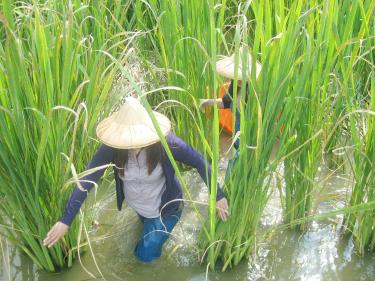Agritourism:
a growing industry
Traditional farms are transitioning into leisure-oriented enterprises as a way to lessen the impact of urbanization and counter the adverse effects of agricultural imports on the economy. It also gives farmers a chance to make some extra cash
Wearing a straw hat and waterproof jumpsuit, Lin yu-tsen guides tourists to experience the harvesting of fresh water bamboos.
Photo: Nancy Liu, Taipei Times
Wearing a straw hat and dressed in farmer’s attire, Lin Yu-tsen (林宥岑) said she made the right decision when she left an accounting job to look after her family’s water bamboo.
“Not only do I make more money now, I’m also helping to bring life to this area, which has been quiet for a long time,” she said.
Five years ago, farming was the main source of income for the small town of Puli in central Taiwan’s Nantou County, as well as some 4,000 other villages around the country. At the time, families worked as a unit around the clock in the fields, took care of animals and, of course, each other.
Today, the younger generation is flooding into cities for higher-earning and less labor-intensive jobs, bringing about a drastic change in the population structure on farms. Agriculture has become a graying profession, with the average age of Taiwanese farmers standing at 61 and growing.
“It’s a bit sad when you think about it because the only visitors here used be to sons and daughters living in cities. They come back regularly to see their children whom they trust their parents with,” the 38-year-old Lin said.
Despite that, Lin, like many her age, had no intention of trading in her air-conditioned office for one under the sun until a crisis came along: her employer was on the brink of bankruptcy and started slashing jobs.
“The misfortune was actually a blessing in disguise,” she said. It prompted her to start up an agritourism business on her family’s hundred-year-old water bamboo plantation.
With creativity and enthusiasm, she renovated a sanhoyuan (三合院), a traditional three section housing compound, into lodging and organized a series of activities targeting urban families with small children.
For example, visitors, wearing waterproof jumpsuits, can roam through the water fields and harvest fresh bamboo. After that, they can either chop the high-fiber vegetable into dumpling fillings or preserved delicacies to take home.
“My intention is not to sell the produce,” she said, “I am promoting a new kind of tourism where experience is the core value.”
From time to time, foreign backpackers also call her up, wanting to have an authentic taste of Taiwan’s rural living before it dies out.
The business yields monthly revenue of about NT$200,000 and comes with the benefit of flexible working hours and fulfilling family obligations. She said that her siblings as well as local farmers are eager to follow her footsteps in the agritourism business.
Burgeoning industry
Since the late 1980s, farmers have been encouraged to transition away from traditional farming and focus on recreation-oriented enterprises as a way to lessen the impact of urbanization and counter the adverse effects of agricultural imports on the domestic economy.
A decade later, the development of agritourism was fueled by the urgent need to reconstruct areas devastated by the 921 earthquake that hit central Taiwan, a region originally founded on farming. The 7.3 magnitude earthquake left more than 2,400 dead, 11,000 injured and over 10,500 houses damaged.
Today, Nantou, Taichung and Changhua together are home to most leisure farms in Taiwan.
In a recent effort to promote agritourism, the Council of Agriculture launched a Web site in Chinese and English that offers users detailed itineraries ranging from fruit-picking trips to firefly watching tours.
Agritourism:
a growing industry
Traditional farms are transitioning into leisure-oriented enterprises as a way to lessen the impact of urbanization and counter the adverse effects of agricultural imports on the economy. It also gives farmers a chance to make some extra cash
Farm tour experience
The hard work paid off, with the agritourism industry contributing NT$7.28 billion to the country’s economy in 2011. More than 14 million visits were made to leisure farms that year, according to COA statistics.
Currently, there are 467 registered leisure farms in Taiwan. The number is expected to be much larger because owners running small-scale agritourism would most likely not apply for a license.
“Such farms are springing up like mushrooms nowadays,” said Peter Lin (林文攀), founder of Topology Travel (拓璞行銷), a travel company that caters to foreign tourists who like exploring sites other than Taipei 101 and the National Palace Museum.
Seeing a surging market demand, Peter Lin said his company is planning to include farm experience tour series into its service.
As agritourism continues to prosper, however, some cautiously warned the negative effects of over-developed tourism, especially on the environment and culture.
Agritourism is more sophisticated than revamping buildings and getting more businesses, said Perng Ming-hwei (彭明輝), a retired professor from National Tsing Hua University, in an article published a few years ago.
Citing a government-led project that erected a fancy European-style structure in a rural village in Hsinchu County, Perng said such an undertaking is doing more harm than good because it not only damages the picturesque scenery, but gradually erases the region’s unique culture and history.
A farmer in Taoyuan County agreed with Perng.
“You have to put your heart into it,” said Lo Chi-kuang (羅吉光), a 73-year-old tangerine farmer who avoids industrial materials so as to make his plantation more attractive to city-dwellers and tourists.
Instead of using cement to build concrete steps, for example, he moved stones up from streams and rearranged them by size. Bamboo sticks are gathered to make organic rooftops. Recycled wood parts are turned into vintage road signs.
“I want to avoid artificial elements and keep the place as natural as possible,” he said as he drank from a bamboo mug.
“Agritourism is not just about making farms beautiful; it’s also about making lives on farms more sustainable.”
此篇文章僅供分享,著作權歸原作者所有。
http://www.taipeitimes.com/News/feat/archives/2012/10/25/2003546024/1



 留言列表
留言列表


